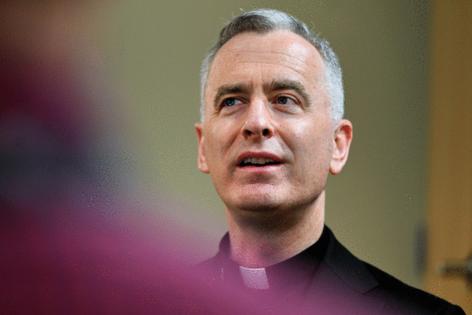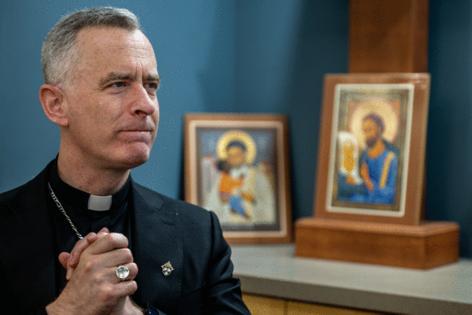The Camden Diocese will no longer oppose a statewide investigation of clergy sex abuse, new bishop says
Published in News & Features
The new bishop of Camden said Monday that his diocese would no longer oppose a statewide investigation of sex abuse by clergy — a stunning reversal after the diocese had spent years arguing in sealed court documents that the probe proposed by the New Jersey Attorney General's Office should not be allowed to move forward.
In an interview, Bishop Joseph A. Williams, who took over as the diocese's sole leader in March, said he had asked the church's attorneys to send a letter to the state Supreme Court on Monday outlining the new position — one that made clear the diocese no longer wants to prevent a grand jury from being impaneled to investigate sexual abuse by priests and other clergy.
Williams said he viewed it as critical for the diocese to support those who had been harmed by the church. "We don't want to do anything that would keep their voices from being heard," he said.
"Our people need to hear this, the clergy needs to hear this, so that it never happens again, first of all," Williams said. "But [also] so that we can do the right thing by the survivors to win their trust, restore their faith, and, God willing, someday maybe find them back in the communion of friendship and worship within the church."
He later added: "We're not going to block a grand jury. We're not going to block a report. We're not going to block a presentment or presentment report."
The reversal in position came just days after attorneys for the diocese had asked the state Supreme Court to prevent prosecutors from pursuing a grand jury report on the subject.
The diocese's attorneys had argued for years — and two lower courts had agreed — that New Jersey law does not permit prosecutors to prepare grand jury reports detailing allegations about private institutions that cannot be prosecuted because of the statute of limitations or problems with evidence.
But Williams — who had spent the past year serving as co-bishop with the recently-retired Dennis J. Sullivan — said he began reexamining that position after an Inquirer article on the subject was published last week.
In the days that followed, Williams said, he spoke to a variety of diocesan officials and the church's attorneys about changing the stance of the diocese toward the proposed investigation.
Then, on Friday, Williams said he met with officials in the attorney general's office to tell them about his intent to work with — rather than oppose — prosecutors handling of the matter. He said he left the meeting encouraged by speaking with prosecutors, whom he viewed as "public servants trying to do the right thing."
"There's no reason we can't be working together to make sure the full story is told and due process is protected," Williams said.
The letter the diocese's lawyers sent to the state Supreme Court on Monday does not end the ongoing legal case — and it was not clear what impact, if any, the change in position might have on the court's decision. The justices had already accepted the case and heard arguments on it, and they could still rule that the attorney general's probe is not permitted under state law.
A spokesperson for the attorney general's office said prosecutors welcomed "the introspection that produced this shift." But the office "remains subject to a trial court ruling, entered at the Diocese of Camden's urging, blocking this presentment process from going forward."
"After years of litigation, kept hidden from public view until the Supreme Court granted our unsealing motion this past March, we look forward to an opinion addressing these important questions," the spokesperson said.
Mark Crawford, the New Jersey director for Survivors Network of those Abused by Priests, said he was "very pleased" to hear about Williams' new position.
"I'm cautiously optimistic that we're finally seeing a bishop who has the backbone to do what is morally right instead of the hardball legal tactics victims have experienced time and time and time again," Crawford said.
The diocese's legal fight has its roots in a 2018 announcement by then-New Jersey Attorney General Gurbir Grewal. After prosecutors in Pennsylvania that year released a sprawling grand jury report detailing decades of clergy abuse across the state, Grewal said his office would seek to do the same.
But in 2021, Camden's diocese filed a sealed motion in the case, saying grand jury reports in the state cannot single out the church or any other private organization and detail allegations that prosecutors can't or won't charge, either due to the statute of limitations or other issues with evidence.
Such reports, lawyers for the church said, must instead be focused on misconduct by government agencies or officials.
Two years later, Mercer County Superior Court Judge Peter Warshaw sided with the diocese during a closed-door hearing. And he went a step further and blocked prosecutors from impaneling a special grand jury, ruling that to do so would be a waste of time and resources if the intended outcome was not legal.
An appellate court later affirmed Warshaw's ruling. Prosecutors appealed both decisions.
The diocese continued its opposition — insisting that it did not oppose grand juries investigating and charging crimes by priests, but saying that state law simply didn't allow prosecutors to produce the type of wide-ranging report that Grewal had promised.
Victims of clergy abuse said the church's attempts to block a public reckoning were an effort to protect the institution at the expense of its parishioners' welfare. And some were particularly outraged that the source of the resistance was Camden's diocese, which declared bankruptcy in 2020 over a wave of sex abuse lawsuits and ultimately agreed to pay about 300 complainants $87.5 million.
(The diocese's role in opposing the investigation was revealed in March, when the state's high court agreed to hear the case and unsealed documents that revealed the church's legal stance.)
Williams alluded to his different views on the matter in a letter to parishioners last week, writing: "It must be demoralizing to hear the Church preach transparency and then, apparently, to fight against the very transparency it preaches."
He also said he met in February with an abuse victim who disapproved of the diocese's legal stance. Williams, in his letter, called his conversation with the victim "outstanding," adding: "It has helped me to be a better bishop and to work toward a healthier, more transparent Church."
Still, he did not instruct his attorneys to change the diocese's position in court until last week — after they had argued before the state Supreme Court.
He said in the interview Monday that the issue "wasn't on my front burner" as he got up to speed during his first few weeks as the diocese's lone bishop during a busy month — one in which Catholics celebrated Easter and mourned the death of Pope Francis.
But after having spent more time with the matter in recent days, he said, it became clear that he wanted to partner with prosecutors — and ultimately allow victims to be heard — rather than seek to stymie the investigation.
"We're going to work as closely as possible with the attorney general's office in good faith," he said. "Assuming we're at the table together ... I have almost 100% confidence that that collaboration is going to bear good fruit."
©2025 The Philadelphia Inquirer, LLC. Visit at inquirer.com. Distributed by Tribune Content Agency, LLC.










Comments